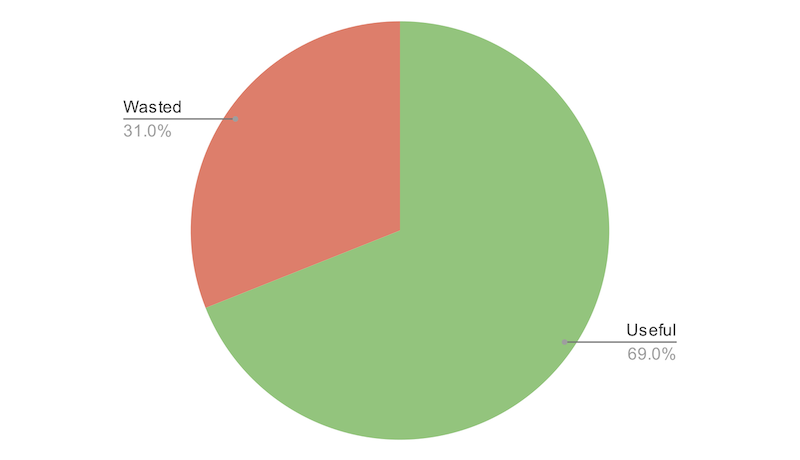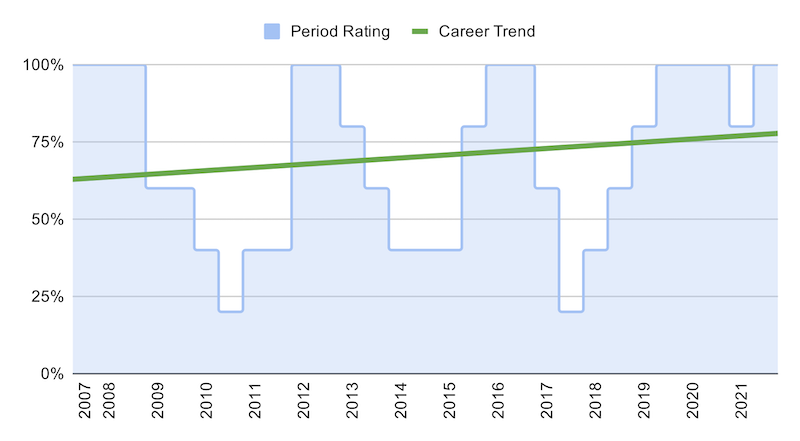How to reflect on your career?
A few years ago my wife started a yearly journal where we write about the last year and set goals for the new year. I was going about doing my bit for 2021 but that led me to reflect upon my whole career. I read this excellent article about wasting your career and got inspired to go through the exercise. I soon realised that while it’s excellent advice, the indicators don’t exactly match my criteria of defining a wasteful period so, obviously, I decided to define my own.
Indicators of a useful period in your career
1. Growth
What did you learn in the last six months?
You can grow at work by picking up skills like writing good documents, getting better at database optimisations or doing performance reviews. These directly make you more employable and are usually listed down as requirements in job ads.
You can also grow by gaining unique experiences e.g. helping grow your org from 5 to 20 engineers or working on a service that scales from 100k to 5 million users. In both of these examples you are likely to face and solve problems that will help form a playbook for the future. These experiences aren’t always easy to quantify but they will define your career.
I try not to associate growth with promotions because they mean different things in different jobs but if you have stayed in the same job for very long, you could use that as a complementary indicator.
2. Impact
What did you accomplish over the last six months?
There are many ways you can have impact but ideally it must be connected to your work’s mission and goals. You could have direct impact like saving money for the company, launching a successful product or helping them grow to a new market. You could also have indirect impact such as making critical systems faster and more efficient, building the localisation system that enables multiple language support, or coaching people in your team to help them deliver faster.
Many of you would already be familiar with writing this down for your performance reviews, but if you don’t do those think about how you spent the majority of your time and how that contributed to your team or company’s goals. If you are struggling to connect your work with the impact it had or will have, I would highly recommend talking to your line manager about this. Understanding your work’s impact is essential to having a purposeful career.
3. Culture
Did you find it easy to belong? Were you passionate about the mission?
This is the hardest one to define but irrespective of your opinions about organisational culture, you can’t deny that everyone holds some baseline expectations for their teams and companies. For some, if they believe in the company’s values and mission, they are willing to tolerate most colleagues. For others, the people they interact with day to day are the most important and they don’t care so much about what the company stands for or promotes. It’s okay to be in any category as long as you are aware of what’s important to you and if you got that in your job in the last six months.
4. Life
Were you able to balance your work with what’s important in your personal life?
There have been times where I prioritised my personal life over work. I still did my job but I wasn’t really optimising for career growth. It’s good to acknowledge this as an indicator because you may want to prioritise it higher or lower in different phases of your life.
While I personally consider this as a work-life balance indicator, you can to tweak it to fit what’s important to you. It might be important for you to make a lot of money becuase you want to FIRE and if your job lets you optimise for that, it’s a good choice for your life! Obviously limit this to a few years because not focusing on your health will lead to burnout.
Are these indicators equally important?
I started with equal weights and realised that I’ve generally optimised my career for growth and not factoring for that doesn’t make sense. I’ve often changed jobs and teams because I was passionate about an industry or technology. This reduced the impact I could have had, especially in the first few months, but got me invaluable experience and I never felt bad about the decision.
I’ve set the weight for growth to 40% and the other three indicators to 20%. Anything below 50 marks a wasted period and ideally you should try to stay above 75. With these weights in place, the combinations become quite interesting and I’ve shared a few examples ahead.
Impact + Culture 🔴
You love the mission and put ridiculous hours at work but you stay within your area of expertise and don’t look for opportunities to grow. During this period people often feel they are doing great but I consider this as a wasted period where you toil and increase chances of burnout.
Culture + Life 🔴
You love working with your team and the job allows you to balance your work and personal life but you aren’t learning or having any meaningful impact. These jobs/teams are often the hardest to quit but if you want to have a purposeful, rewarding career you need to identify these and move on.
Growth + Impact/Culture/Life 🟢
You can have short periods in your career where you focus on growth and ignore a couple of other parameters. These are generally short because typically the focus on growth will help increase your impact, allow you to make more time for your personal life or at least make it easier to find a new job that’s a better cultural fit.
Reflecting on my career

How much time did I waste?
The whole point of this exercise was to apply this to my own career and after spending all the time identifying these indicators, and I did finally get to that. The result was rather disappointing - I had wasted 31% of my career (over 4 years!) but all the retrospection felt really helpful so I decided to analyse the peaks and troughs and drew a trend line on the series. Thankfully that showed that my career is on a slow but upward trajectory.

How does my career look on a graph?
The period that stood out to me was the first 4.5 years of my career. I went straight from university to a large software company, learned a lot but also got rather comfortable with my role and team. I stayed in a bubble where most of my friends worked at the same place and it made it really hard to see what I was missing out. I waited too long to switch and ended up picking the first job that felt different and paid better. It was clearly a rushed decision and ended up being much worse for my career. Until I switched jobs yet again, I had little idea of what a rewarding and high growth job looks like and that made it hard to understand what I was missing.
Final thoughts
Some of my learnings from this exercise will definitely end up in my toolbox for helping folks make the most out of their careers. If you found this interesting, I would highly recommend spending some time reflecting on your career too, it’s totally worth the effort.
If you do, I’ve shared a Google Sheets template based on what I used to gather data and plot charts above. I would love to hear about your results!